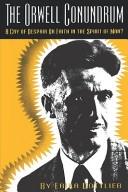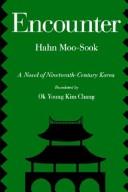| Listing 1 - 2 of 2 |
Sort by
|

ISBN: 0773591516 9780773591516 0886291747 9780886291747 0886291755 9780886291754 Year: 1992 Publisher: Ottawa Don Mills, Ont.
Abstract | Keywords | Export | Availability | Bookmark
 Loading...
Loading...Choose an application
- Reference Manager
- EndNote
- RefWorks (Direct export to RefWorks)
An important contribution to the understanding of George Orwell's thought, particularly to Nineteen Eighty Four. The author challenges the view of the novel as a flawed work of crushing pessimism, arguing convincingly that it is a great humanist's mature vision of his deeply troubled times.
Orwell, George, --- Orwell, George. --- Orwell, George --- Orwell, Georg --- Āravēla, Jorja --- Blair, Eric Arthur --- Oruel, G., --- Oravēla, Jyorja --- Orvel, Džordž --- Orṿel, G'org' --- Oruell, Dzhordzh --- Oruel, Dzhordzh --- Ārvel, Jārji --- Ōweru, Jōji --- Ūrvil, Jurj --- Jārj Ārvil --- אורוול, גורג, --- אורוול, ג׳ורג׳ --- אורול, ג׳ורג׳, --- اورويل، جورج --- 奥威尔乔治, --- آرول، جارج، --- Criticism and interpretation. --- English literature --- LITERARY CRITICISM / General. --- History and criticism.

ISBN: 9786612356117 1282356119 0520911083 0585130612 9780520911086 9780585130613 9780520073807 0520073800 9780520073814 0520073819 0520073800 0520073819 Year: 1992 Publisher: Berkeley, Calif. University of California Press
Abstract | Keywords | Export | Availability | Bookmark
 Loading...
Loading...Choose an application
- Reference Manager
- EndNote
- RefWorks (Direct export to RefWorks)
This historical novel, Encounter (Mannam), by Hahn Moo-Sook, one of Asia's most honored writers, is a story of the resilience in the Korean spirit. It is told through the experiences of Tasan, a high-ranking official and foremost Neo-Confucian scholar at the beginning of the nineteenth century. Because of Tasan's fascination with Western learning, then synonymous with Catholicism, he is exiled to a remote province for 18 years. In banishment he meets people from various social and religious backgrounds-Buddhist monks, peasants, shamans-whom he would not otherwise have met. The events of Tasan's life are effectively used to depict the confluence of Buddhist, Neo-Confucian, Taoist, and shamanistic beliefs in traditional Korea.A subplot involves three young sisters, the daughters of a prominent Catholic aristocrat, and affords the reader vivid glimpses into Yi-dynasty women's lives, particularly those of palace ladies, scholars' wives, tavern keepers, shamans, and slaves. In contrast to the long-held Confucian stereotype of female subservience, this story illustrates the richness of women's contribution to Korean culture and tradition.Encounter's detailed narrative provides a broad and informed view of nineteenth-century Korea, making it a highly useful book for courses on Korean literature and society. It will also be an engaging read for lovers of historical fiction.
LITERARY CRITICISM / General. --- Chŏng, Ha-sang, --- Chŏng, Yag-yong, --- 丁夏祥, --- Chŏng, Tasan, --- Chŏng, Yong, --- Tei, Jaku-yō, --- Chŏng, Yŏyudang, --- Chong, Yagyong, --- Da-San, --- Tasan, --- Yŏlsu, --- Jung, Yak-yong, --- 丁 若鏞, --- 丁若鐮, --- 정 약용, --- 정약용, --- Ding, Ruoyong, --- Korea --- K9717.60 --- Korea: Literature -- fiction and prose -- works by individual authors -- modern (1860s- ) --- Asian literature --- Biographicalfiction. --- Saam, --- 19th century. --- academic. --- american influence. --- americanization. --- aristocracy. --- asian history. --- asian literature. --- belief. --- buddhism. --- buddhist. --- catholicism. --- christian. --- christianity. --- class structure. --- dynasty. --- exile. --- faith. --- historical fiction. --- historical. --- justice. --- korea. --- korean culture. --- korean history. --- korean literature. --- korean tradition. --- law and order. --- monks. --- neo confucian. --- religion. --- religious studies. --- scholar. --- shaman. --- western world. --- world history. --- world religion.
| Listing 1 - 2 of 2 |
Sort by
|

 Search
Search Feedback
Feedback About UniCat
About UniCat  Help
Help News
News